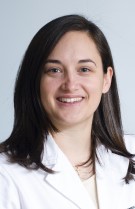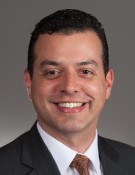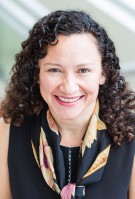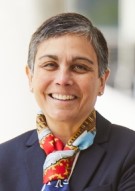Clinician-Teacher Development Award Recipients
"The Clinician-Teacher Development Award was the foundation and opportunity I needed to start my research in health care disparities. I certainly would not be where I am today if it was not for this award and the support the CDI offered me and has continued to provide."Marcela del Carmen, MD
President, Massachusetts General Hospital
President, Massachusetts General Physicians Organization
Executive Vice President, Mass General Brigham
2005 CTDA Recipient
Award Recipients
2024
 Ada Amobi MD MPH
Ada Amobi MD MPH
Clinical Equity Director, Division of Internal Medicine, Department of Medicine
Instructor in Medicine, Harvard Medical School
Dr. Amobi is the Clinical Equity Director for the Division of Internal Medicine, an attending in the Albright Medical Service, and an Instructor in Medicine at Harvard Medical School. Dr. Amobi has a wide breadth of knowledge and expertise in health equity. In her prior role as the Physician Lead of the Health Equity Institute at the Rhode Island Department of Health, she served as the department lead on Culturally and Linguistically Appropriate Services and advanced language access support in state clinical settings. Dr. Amobi led the health department’s efforts at improving internal competency in equity principles and advancing equity across various department programs.
Her academic interests include improving care of patients with limited English proficiency, addressing health disparities, and using community-led interventions to improve population health. She is a member of the Mass Medical Society’s Committee on Public Health and Chair of the society’s Committee on Violence Intervention and Prevention.
Dr. Amobi completed her medical training at Harvard Medical School and Master’s in Public Health from the Harvard School of Public Health. She completed her residency in Internal Medicine at MGH where she received the Allan F. Moore Memorial Award for Community Service.
Abstract: Implementing a Data-Informed Curriculum to Improve Care of Patients with Limited English Proficiency.
Effective communication is a foundational pillar of high-quality clinical care. In the United States, patients who do not speak English fluently are at risk of worse health outcomes due to miscommunication with their medical team. This risk can be mitigated through consistent use of certified interpreters and bilingual staff who have been certified as fluent in additional languages. This project seeks to improve staff skills around the use of interpreters and to increase the number of bilingual staff that complete qualified bilingual status within the Division of General Internal Medicine. This goal will be reached through first conducting research on current language access practices in the division and analyzing patient experience feedback from patients who do not speak English fluently. This data will then be used to develop, pilot, and further refine a training session and resource packet for division staff. Training will include best practices for commonly encountered challenges in the care of patients with LEP and guidance for bilingual staff to pursue qualified bilingual certifications as part of the training curriculum.
 Carine Davila, MD, MPH
Carine Davila, MD, MPH
Equity Director, Division of Palliative Care and Geriatric Medicine
Center for Aging and Serious Illness, Mongan Institute
Assistant in Medicine, Massachusetts General Hospital
Instructor in Medicine, Harvard Medical School
Dr. Davila is a palliative care physician who is passionate about improving access and quality palliative care for historically marginalized populations and particularly for Latino Spanish-speaking patients. She serves as the Equity Director for the division and the Assistant Director of Equity for the MGH Continuum Project. She co-created the palliative care integrated health equity curriculum and co-leads Mass General Brigham’s United Against Racism efforts to reduce disparities in serious illness communication for marginalized communities.
Dr. Davila completed undergraduate studies in public policy at Princeton and received her medical degree from the Icahn School of Medicine at Mount Sinai. She completed a residency in Internal Medicine at the University of California San Francisco and fellowship at the Harvard Interprofessional Palliative Care Fellowship. After clinical training, Dr. Davila was selected as a Commonwealth Fund Fellow in Minority Health Policy at Harvard University and pursued her MPH from the Harvard Chan School of Public Health.
Abstract: Developing an Evidence-Based Behavioral Change Intervention to Improve Serious Illness Communication for Latino Spanish-speaking Patients and Caregivers
People living with serious illness encounter communication challenges, compounded for people with limited English proficiency, with clinicians that lead to emotional distress and lower quality care. Serious illness communication (SIC) is a key element of high-quality palliative care but is less likely to occur with Latino Spanish-speaking individuals, a population that faces multiple barriers to equitable care. One in five U.S. residents identify as Latino, two-thirds who speak Spanish at home. The Latino population accounted for 52% of population growth in the last 10 years. There is a critical need to develop culturally tailored serious illness communication strategies for this growing population.
I will characterize the barriers and facilitators to clinicians engaging seriously ill Spanish-speaking patients and caregivers in SIC, including qualitative interviews with language-concordant and language-discordant palliative care clinicians and primary team clinicians caring for seriously ill Spanish-speaking patients. I will use these findings, together with perspectives of patients, caregivers, and medical interpreters (in separately funded effort), to develop and refine a behavioral change intervention for clinicians to better meet the needs of Latino Spanish-speaking patients. Finally, I will conduct an open pilot with a small number of Spanish-speaking patients and caregivers who engage in SIC with intervention-trained clinicians.
2023
 Linda Herrera Santos, MD, PhD
Linda Herrera Santos, MD, PhD
Department of Psychiatry
Director, MGH Hispanic Psychiatry Clinic
Avery D. Weisman Psychiatry Consultation Service
Instructor in Psychiatry, Harvard Medical School
Dr. Linda Herrera Santos serves as the Director of the MGH Hispanic Psychiatry Clinic. She is an Instructor in Psychiatry at Harvard Medical School and an attending psychiatrist in the Psychiatry Consultation Service at MGH. She teaches and supervises MGH/McLean Psychiatry residents and is the co-director of the Sociocultural Didactics Series. Dr. Herrera Santos obtained her medical degree from Texas A&M Health Science Center. She completed the Adult Psychiatry Residency Training at MGH/McLean, followed by the MGH Consultation-Liaison Psychiatry Fellowship. As a trainee, Dr. Herrera Santos was awarded the APA SAMHSA Minority Fellowship, which funded a project addressing mental health in underserved populations. She founded the Hispanic Psychiatry Clinic and secured funding for its pilot through an MGH Collaboration Catalyst Grant and a Research Grant through the MGB Centers of Expertise. Dr. Herrera Santos’ clinical and research interests are focused on delivering mental health services to Hispanic populations. She is committed to expanding initiatives promoting an inclusive healthcare community and delivering excellent, compassionate, and culturally humble care.
Abstract: Addressing Mental Health Care Disparities Through Resident Training: Evaluation and Expansion of a Hispanic Psychiatry Resident Clinic
Attaining optimal quality mental health care for Hispanic patients, particularly monolingual Spanish-speaking patients, has been challenging due to the scarcity of bilingual providers with adequate training in culturally-sensitive care. This has led to critical gaps in care and inequitable health outcomes for Hispanic patients. To address this gap, a pilot for a Hispanic Psychiatry Resident Clinic was developed at Mass General to provide Spanish-speaking residents with advanced clinical training in psychiatric care for Hispanic patients. Residents in this pilot provide direct, longitudinal, culturally-sensitive psychopharmacology or psychotherapy services to monolingual Spanish-speaking patients. In addition, residents have access to supervision with bicultural/bilingual faculty to discuss cases. They also attend monthly didactics focused on topics relevant to mental health care delivery in Hispanic communities. This study aims to evaluate and enhance the training mission of the Hispanic Psychiatry Resident Clinic to address the need to develop a workforce of psychiatrists who provide culturally informed care to Spanish-speaking patients. Interviews and impact data collected from residents will guide this work. By the end of this project, we will have a formalized curriculum and clinic structure that could then be easily disseminated for implementation at other institutions.
 Aisha James, MD, MEd
Aisha James, MD, MEd
Internal Medicine and Pediatrics
Instructor in Medicine, Harvard Medical School
Originally from Milton, MA, Dr. James earned her undergraduate degree in Psychology and French from Amherst College, her Master’s of Education from Brooklyn College, and her MD from Mount Sinai School of Medicine. She worked as a special education teacher in NYC prior to medical school. She completed a combined residency in Internal Medicine & Pediatrics at Massachusetts General Hospital, and served as a Chief Resident. Dr James now works as a PCP at MGH Everett Family Care and the MGH Sickle Cell Disease Center. She also works to promote equity at MGH as the director of Racial Justice for the Department of Medicine, and Associate Director for Diversity and Equity for the Department of Pediatrics. Outside of MGH, she engages in legislative advocacy as an active member of the Massachusetts’ American College of Physicians Health and Public Policy Committee and the Massachusetts’ American Academy of Pediatrics Legislative Committee. Dr. James’ current CTDA project is focused on infusing graduated medical education with an anti-racist and equity lens through a coaching program.
Abstract: Utilizing the Department of Medicine’s Anti-Racism and Equity Educational Initiative to Improve Equity in Graduate Medical Education
Provider-held bias and systemic inequities contribute to racial and ethnic health disparities. Graduate medical education (GME) curricula have been expanded to include stand-alone health equity series. However, GME curricula may still, inadvertently, reinforce stereotypes and further health disparities. To support the integration of anti-racism and equity across GME curricular content we developed and implemented the Department of Medicine’s Anti-Racism and Equity Educational Initiative (DARE). DARE trained volunteer coaches to support educators using a checklist of best practices to bring an anti-racism and equity lens to their lecture content. Evaluation of the DARE pilot program demonstrated improvement in the anti-racism and equity content of existing internal medicine residency educational conferences. The current project aims to further expand and evaluate DARE across different departments and specialties.
2022
 Nkechi Conteh MBBS, MPH
Nkechi Conteh MBBS, MPH
Department of Psychiatry
Associate Program Director, MGH/McLean Psychiatry Program
Instructor in Psychiatry, Harvard Medical School
Dr. Conteh is a psychiatrist at the Center for Women’s Mental Health, Massachusetts General Hospital, an Associate Program Director of the MGH/McLean Psychiatry Residency Program, and an Instructor in Psychiatry at Harvard Medical School. She completed her adult psychiatry residency program at Duke University Hospital and obtained a Master’s in Public Health from Harvard T.H. Chan School of Public Health. Dr. Conteh specializes in reproductive and perinatal psychiatry and health disparities research and is a clinician-educator in Community and Global psychiatry. At Duke, she developed a structured EMR referral system to promote the inclusion of pregnant women of color in psychiatric care. At MGH, she directs a collaborative care psychiatry clinic for pregnant/postpartum women at MGH Revere Health Center and is a Staff Psychiatrist at MGH Center for Women’s Mental Health. As a member of the MGH Chester Pierce Division of Global Mental Health, she assists with residency training in West Africa.
Current projects include directing a mentorship program for underrepresented in medicine residents and faculty, developing a psychiatry residency program in Sierra Leone, and creating a health disparities track for the MGH/McLean Physician Scientist Program. Recent honors include the Association of Women Psychiatrists’ International Fellowship, the American Psychiatric Association Research Colloquium for Junior Investigators, the Group of Advancement of Psychiatry Fellowship, and the American College of Psychiatry Laughlin Fellowship.
Abstract: MGH/McLean Psychiatry Underrepresented in Medicine Mentorship Program (PUMP)
Mentorship of residents is critical to developing a successful career in medicine. Mentored residents are more likely to report excellent career preparation and reduced levels of burnout. Multiple studies have shown that residents who are underrepresented in medicine (UiM) are significantly less likely to establish a mentorship relationship than their peers. Recent evidence also suggests that UiM residents and faculty experience higher levels of isolation and lower career satisfaction than peers. In the past, academic institutions have sought to address the challenges faced by UiM trainees through peer mentorship and diversity training for staff and faculty. However, these initiatives have primarily prioritized academic achievement and research. This project employs the novel approach of targeting community support as a focus of mentorship by creating a structured mentorship program that provides monthly didactics to participating UiM faculty on topics unique to the UiM trainee experience. It also seeks to improve social connections through a structured pairing of UiM residents and UiM faculty that centers on interpersonal connectedness and incorporates a mentoring agreement plan highlighting the aspects of community support to be addressed. The effectiveness of the educational workshop for faculty and the residents' mentorship experience will be assessed through pre- and post-intervention surveys and semi-structured interviews at timed intervals.
 John O. Hwabejire, MD, MPH
John O. Hwabejire, MD, MPH
Division of Trauma, Emergency Surgery, and Surgical Critical Care
Department of Surgery
Assistant Professor of Surgery, Harvard Medical School
John O. Hwabejire, MD, MPH, is an Assistant Professor of Surgery at Harvard Medical School and a Trauma and Acute care surgeon and Surgical Intensivist at the Massachusetts General Hospital and Newton-Wellesley Hospital. In addition to the broad spectrum of trauma, surgical critical care, emergency general surgery, and elective general surgery, his clinical interests include complex abdominal wall hernias, necrotizing soft tissue infection, wound care, and multidisciplinary surgical care of the elderly. His research interests include rapid triage of emergency general surgery patients and optimization of elderly patients for elective and emergency surgery. Dr. Hwabejire completed medical school at the College of Medicine, University of Ibadan, Nigeria, followed by a Master of Public Health in Healthcare Management and Policy at the Harvard T.H. Chan School of Public Health. He was a Research Fellow in Trauma, Emergency Surgery, and Surgical Critical Care at the Massachusetts General Hospital and Harvard Medical School. He did his general surgery residency at the Howard University Hospital in Washington, DC and completed his fellowships in Trauma & Acute Care Surgery and Surgical Critical Care at the Massachusetts General Hospital. He sits on the Geriatric Surgery Committee of the American Association for the Surgery of Trauma. He is the Director of Trauma and Emergency Surgery Research and the Director of Quality and Safety in the Division of Trauma, Emergency Surgery and Surgical Critical Care at the Massachusetts General Hospital. He also serves as the Co-director of the MGH Advanced Trauma Life Support Courses.
Abstract: Improving Short-term and Long-term Clinical and Functional Outcomes in Geriatric Emergency General Surgery Patients
Elderly individuals are the fastest growing population in the United States. The need for surgical intervention in this population is projected to increase even more. Due to physiologic changes associated with aging as well as the presence of a larger burden of pre-existing medical conditions, the ability of elderly patients to tolerate the stress of surgery is decreased. As a result, the question of whether or not to operate on elderly patients is a difficult one, especially in elderly patients presenting with emergent surgical conditions. One reason for this is the absence of post-surgical outcomes data in the elderly. Modern surgical practice is focused on death or survival as outcomes, but elderly patients place more value on ability to function after surgery. There are hardly any standard recommendations on how to care for elderly patients who require emergency general surgery. The overall goal of our study is to redefine how geriatric emergent surgical care is provided in the 21st century by assessing the current state of geriatric emergent surgical care, provide short- and long-term clinical and functional outcomes data, identify factors that contribute to poor outcomes, and specifically address these factors with a view to improving the quality of care.
 Theresa Williamson, MD
Theresa Williamson, MD
Department of Neurosurgery
Assistant Professor of Neurosurgery, Harvard Medical School
Dr. Williamson is an assistant professor of neurosurgery and surgical ethics researcher who cares for people with all types of spine disorders as well as brain and spinal trauma. Her clinical expertise includes tailoring an approach to best fit the patient and their disease including using minimally invasive techniques. Her research focus is neurosurgical decision-making and patient-doctor communication as well as health care disparities. She combines bioethics theory with empirical data science to tackle complex decision-making problems in neurosurgery. Dr. Williamson is a member of the Center for Outcomes and Patient Safety in Surgery (COMPASS) at Massachusetts General Hospital.
Dr. Williamson comes to MGH from Duke University. At Duke, she completed a neurosurgery residency. She then completed an intramural fellowship at Duke as part of the combined neurosurgery and orthopedic surgery complex spine fellowship approved by the Committee on Advanced Subspecialty Training (CAST). Her clinical skills were recognized when she was named the Resident Clinician of the Year (2017) and her leadership skills were recognized with the Leadership Award (2020). She completed the University of Chicago Maclean and American College of Surgeons Surgical Ethics Fellowship (2021). She is a graduate of the Yale School of Medicine (2014) and Yale College (2009) where she was a varsity soccer player.
Abstract: Helping Spine Surgeons Help Patients: An analysis of Surgical Candidacy and Shared Decision Making for Patients with Degenerative Spondylolisthesis
Back pain is one of the largest disablers of people worldwide (Safiri 2020). As the population ages, so does the number of patients with disabling back pain. Patients are often sick medically and may not be the “ideal” operative candidates. Particularly for patients of color and lower income patients, surgery is often avoided (Schoenfeld 1976). However, we have an opportunity to help return function and decrease pain in correctly selected patients (Riley 2018).The goal of this study is to figure out which patients might be appropriate for surgical intervention and which would have the same or better outcomes with no surgery at all. If there are patients, particularly patients of color that aren’t getting surgery despite a high likelihood of pain relief post- operatively, we will study whether decision aids increase decision concordance.
2021
 Paula A. Aduen, PhD
Paula A. Aduen, PhD
Department of Psychiatry
Massachusetts General Hospital Multicultural Assessment and Research Center
Massachusetts General Hospital Multicultural Alzheimer’s Prevention Program
Instructor, Harvard Medical School
Dr. Aduen is a Clinical Neuropsychologist within the Massachusetts General Hospital Department of Psychiatry, junior research faculty in the Multicultural Alzheimer’s Prevention Program (MAPP), and is an Instructor in Psychology at Harvard Medical School. She serves as Assistant Director of the Multicultural Assessment and Research Center (MARC). She received her doctoral degree in Clinical Psychology from the University of Virginia. She completed her psychology residency at the University of Chicago Medicine and post-doctoral fellowship in clinical neuropsychology at the Harvard Partners Consortium (Massachusetts General Hospital/Brigham and Women's Hospital/HMS).
Dr. Aduen's primary clinical interests are in aging, neurodegenerative diseases, and multicultural neuropsychology. She is committed to serving historically underrepresented communities through promoting greater accessibility and providing culturally-sound practices in neuropsychology to the Latino community. At MGH MARC, she provides neuropsychological evaluations to culturally and linguistically diverse adult patients presenting with a range of cognitive concerns. Dr. Aduen has dedicated most of her research career to examining the relationship between cognition, behavior, and functional outcomes in neurodevelopmental, neurological, and neurodegenerative disorders. Currently, her research interests include development and validation of neuropsychological instruments sensitive to pre-clinical cognitive change in Alzheimer’s disease, as well as, understanding chronic and cumulative life stress as a risk factor for cognitive decline among Latinos. She is passionate about the translatability of these findings to aid in the identification and operationalization of modifiable risk factors that place Latinos at greater risk for accelerated aging and dementia.
Abstract: Chronic Stress as a Risk Factor for Age-Related Cognitive Decline in Latinos
Prevalence rates of Alzheimer’s disease and related dementias (ADRD) are greater among older Latinos and African Americans compared to their White-Caucasian counterparts. While it is well established that older age and family history are risk factors for ADRD and accelerated aging, there has been increasing interest in identifying potentially modifiable lifestyle factors to mitigate risk among vulnerable populations. It has been estimated that about 40 % of the risk to develop ADRD could be reduced by modifying lifestyle factors. Chronic stress, both psychological and biological, emerges as a strong candidate factor for exploration given its association with adverse health outcomes, which in turn impact aging and cognition. Given several psychosocial factors associated with immigration- and acculturation-related stress, it is unsurprising that Latino immigrants are particularly at risk for adverse health consequences from chronic stress. As such, investigating whether chronic stress impacts cognitive decline, and overall risk for ADRD in older Latinos is pivotal to improve prevention, early detection, and development of novel treatments and interventions for this critically underserved and understudied population. This will be one of the first studies to examine chronic stress, through a multi-pronged assessment approach utilizing both psychological constructs and biological measures of stress, as a risk factor for cognitive decline in older Latinos. The precise and thorough measurement approach to this study is undoubtedly a strength that will help clinicians understand at which facet of stress a potential intervention is plausible and meaningful.
 Onyinyechi F. Eke, MD
Onyinyechi F. Eke, MD
Department of Emergency Medicine, Division of Emergency Ultrasound
Director, Global Ultrasound
Instructor in Emergency Medicine, Harvard Medical School
Dr. Eke is an emergency medicine physician and Director of Global Ultrasound in the Department of Emergency Medicine at Massachusetts General Hospital. She received her undergraduate degree from the University of Maryland, College Park and medical degree from Johns Hopkins School of Medicine, Baltimore. Dr Eke completed emergency medicine residency training at Cook County Hospital, Chicago and fellowship in emergency ultrasound at Massachusetts General Hospital. Dr Eke is a national and international point-of-care ultrasound educator. In 2020, she received the Academy of Emergency Ultrasound Fellow Education Award by the Society for Academic Emergency Medicine. Her research focus is the development of point-of-care ultrasound education and training in resource-limited settings, particularly in Sub-Saharan Africa, and the efficient utilization of point-of-care ultrasound to facilitate patient care in the emergency department.
Abstract: Implementation of Tele-ultrasound in an Academic Emergency Department: A Study of Feasibility, Acceptability and Clinical Impact
Point-of-care ultrasound is a clinically efficient and cost-effective diagnostic modality used in the delivery of care to patients in the emergency department. Its optimum use is dependent on adequate training and proficiency of its users; however, this competency can be variable, even in a tertiary care emergency department. Preliminary data collected at Massachusetts General Hospital show that further support is needed among emergency department clinical providers when using point-of-care ultrasound clinically. This project aims to use tele-ultrasound, remote expert support for ultrasound use and interpretation, to fill this need and to improve point-of-care ultrasound utility in the emergency department, thus improving clinical workflow and patient care. The proposed research will begin with a baseline assessment of point-of-care ultrasound utilization according to the RE-AIM implementation framework. This data along with qualitative interviews will be used to optimize the implementation strategy for tele-ultrasound that will then be assessed through repeat assessment with the RE-AIM framework in a hybrid type II clinical effectiveness implementation evaluation.
 Jona Ludmir, MD
Jona Ludmir, MD
Cardiology Division
Corrigan Minehan Heart Center
Assistant Professor of Medicine, Harvard Medical School
Dr. Ludmir is a critical care cardiologist at Mass General Hospital. He specializes in cardiac intensive care, echocardiography, and heart disease prevention. He is also an Assistant Professor of Medicine at Harvard Medical School. Dr. Ludmir received his medical degree from the Perelman School of Medicine at the University of Pennsylvania. He completed his residency in internal medicine and pediatrics at the Hospital of the University of Pennsylvania and the Children’s Hospital of Philadelphia, cardiology fellowship at the University of Maryland Medical Center, and critical care fellowship at Stanford University Medical Center. Dr. Ludmir is the lead physician for the family-centered care initiated in the Heart Center ICU, where he focuses on incorporating evidence-based guidelines for family-centered cardiovascular care delivery. His research interests include optimizing communication in the ICU, developing family support strategies in the ICU, and improving cardiovascular healthcare disparities.
Abstract: The Hispanic Acute Myocardial Infarction Discharge Intervention Study (HAMIDI)
Hispanic patients disproportionally suffer from disparities in care delivery in the setting of acute myocardial infarction (AMI). More specifically, Hispanic patients have higher 30-day readmission rates post-AMI and are less likely to be referred to cardiac rehab. Because of the challenges Hispanic patients face with post-AMI care, the Hispanic Acute Myocardial Infarction Discharge Intervention Study (HAMIDI) launched with the aim of providing a culturally sensitive discharge framework to improve readmission and mortality rates in this population. Patients enrolled in this study participate in a comprehensive post-discharge program involving follow-up with a Spanish-speaking cardiologist, a two-part educational virtual group visit program, and access to support throughout the duration of the study. In the first year of the study (January 1st, 2022 through January 31st, 2023), 79 patients were screened, of which 71 were eligible for study inclusion. A total of 45 patients, 80% of whom had limited English proficiency (LEP), opted to enroll. Thus far, 35 patients have participated in at least one office or group-based visit. Preliminary data from the 35 patients enrolled in the program revealed a total 30-day readmission rate of 28.6% (including readmission to inpatient and observation units), a 30-day non-elective readmission rate of 17.1%, and a 0% 30-day mortality rate. Of the 35 patients in the first year of the program, 82.9% (n = 29) had LEP, 88.6% (n=31) attended their first appointment, 51.4% (n=18) attended at least one virtual group visit, and 11.4% (n=4) exclusively joined a virtual group visit.
2020
 Katia M. Canenguez, PhD, EdM
Katia M. Canenguez, PhD, EdM
Pediatric Behavioral Health Psychologist, Department of Child and Adolescent Psychiatry
Pediatric/Congenital Cardiology and Raising Healthy Heart Program
Partners Pediatric Multiple Sclerosis
Clinical Researcher, Harvard / MGH Center on Genomics, Vulnerable Populations, and Health Disparities, Mongan Institute Health Policy Center
Instructor, Harvard Medical School
Associate Director, Hispanic Psychiatry Clinic
Director, Latino Initiatives Group, Department of Psychiatry
Dr. Canenguez is a pediatric psychologist in the Department of Child and Adolescent Psychiatry at the Massachusetts General Hospital/MassGeneral for Children and an Instructor at Harvard Medical School. She is also a Clinical Researcher at Harvard/MGH Center on Genomics, Vulnerable Populations, and Health Disparities. Dr. Canenguez earned her BA from Boston College, EdM from Harvard University, PhD from University of Massachusetts, Boston and completed her pre-doctoral internship and post-doctoral fellowship at MGH.
Dr. Canenguez specializes in pediatric behavioral medicine and multicultural psychology. She has been actively involved in providing specialized care to a culturally diverse patient population, both Spanish and English speakers, addressing a wide array of concerns including anxiety, depression, trauma, adjustment issues, often in conjunction with complex medical conditions.
Her research pursuits encompass the domains of disparities and equity, resilience, spirituality, community mental health, global health, and research aimed at catalyzing policy change. She is particularly interested in the intersection of health, mental health, and education, with a steadfast commitment to crafting culturally sensitive, evidence-based prevention and intervention programs geared towards promoting equity.
Dr. Canenguez is dedicated to mentorship, youth empowerment, and community service. She has earned recognition for this work through prestigious awards, including the Greater Boston YMCA's Achiever Award acknowledging her remarkable contributions to both her profession and community service, and the Career Cluster Leadership Award for her collaborative efforts in developing the Health and Medical Sciences career cluster curriculum. She has also had the honor of receiving the MGH Ernesto Gonzales Award for outstanding service to the Latino community and was the recipient off the inaugural Health Equity Scholars award for her work in addressing healthcare disparities.
Abstract: Development and Evaluation of a Resiliency Curriculum: Racial Identity, Racial Justice and Youth Equity
Black, Indigenous and People of Color (BIPOC) can experience high and prolonged levels of stress due to issues of racism and discrimination. Despite studies documenting the negative associations between microaggressions and discriminatory behaviors with health, mental health, and educational outcomes, there remains a lack of programming to ameliorate the potential negative impact of these experiences.
Research suggests that resiliency strategies based on racial identity development principles can enhance coping strategies to manage stress and promote positive well-being of BIPOC youth, with the potential for enhancing school success. Our study will evaluate the Racial Identity/Racial Justice Youth Equity and Resiliency Curriculum developed by Drs. Katia Canenguez and Jonathan Jenkins.
The curriculum is designed to support youth affirm their racial and ethnic identities with pride, to have confidence in their intellect and build resiliency. The program also emphasizes empowering youth as positive assets for society, not only as individuals but also as potential agents of positive social change.
Within the scope of this research, qualitative interviews will be conducted with MGH Youth Scholars Alums, enabling them to express their perspectives on matters concerning race and ethnicity. Furthermore, MGH Youth Scholars will be extended invitations to offer guidance on the ongoing refinement of the curriculum. Given their status as authorities on their personal experiences, their insights play a pivotal role in customizing workshop content to align with the requirements and viewpoints of the youth demographic. Findings from the study will inform the final manualized curriculum, which will be disseminated widely to various stakeholder groups, including schools and youth-focused community organizations.
2019

Carlos Torres, MD
Department of Pediatrics, MGH Chelsea HealthCenter
Associate Director of Diversity & Inclusion, Mass General for Children
Instructor in Pediatrics, Harvard Medical School
Dr. Torres is a pediatrician at MGH Chelsea HealthCare Center and Associate Director of Diversity & Equity at Mass General for Children. He was born and raised in Guadalajara, Jalisco, Mexico. He moved with his family to Milwaukee, Wisconsin during his teenage years, afterwards attending the University of Wisconsin-Madison and earning his bachelor of science in psychology. He received his Doctor of Medicine from Harvard Medical School, then attended pediatric residency at Mass General for Children and served as a chief resident. His clinical and research interests include immigrant health, disparity research, LGBT health, and resiliency. Outside of work, he enjoys spending time with his partner and dog, catching up with his nine siblings and many nephews back home, traveling, and gardening.
Abstract: Implementing and evaluating a longitudinal, interdepartmental cross-cultural care curriculum in pediatrics for residents, attendings, and nurses
Medical trainees must learn to competently care for patients from different cultures. However, a standardized curriculum that teaches cross-cultural care and which has been evaluated for efficacy does not exist in pediatrics at Mass General for Children (MGfC). This project aims to develop, implement, and evaluate a cross-cultural care curriculum in pediatrics, adapting to our current needs. Through this curriculum, participants will be able to recognize that cross-cultural education is a vehicle for enhancing the quality of patient care and building effective healthcare teams, apply practical guidelines to communicate effectively across cultures, and use their own cultural identity as an asset to define the social and cultural issues that are most relevant in the care of diverse patient populations. This curriculum will enable all providers to change their approach to cross-cultural care through reflection on their current practice and active discussion and training of new language and attitudes. Ultimately, the intent is to create and distribute an evidence-based curriculum that can be delivered to the entire department at MGfC, including attendings and nurses, so that it can increase clinicians’ preparedness and competency in caring for a diverse community of patients.

Soo Jeong Youn, PhD
Department of Psychiatry, Massachusetts General Hospital
Director of Evaluation and Clinical Psychologist, Community Psychiatry Program for Research in Implementation and Dissemination of Evidence-based Treatments (PRIDE)
Assistant Professor in Psychiatry, Harvard Medical School
Dr. Youn is the Director of Evaluation and a Clinical Psychologist at Community Psychiatry Program for Research in Implementation and Dissemination of Evidence-Based Treatments (PRIDE) at Massachusetts General Hospital. She is also an Assistant Professor in Psychiatry at Harvard Medical School. Dr. Youn completed her PhD in Clinical Psychology at The Pennsylvania State University, and her Clinical Internship at Massachusetts Mental Health Center, Beth Israel Deaconess Medical Center/Harvard Medical School in 2017.
Dr. Youn’s research and clinical focus include addressing the access-to-care problem and health disparities that exist in mental health and disproportionately impact underserved populations. Her clinical and research endeavors focus on the adaptation of evidence-based practices, and the development of implementation, dissemination and scalable models of these interventions for diverse systems and communities. Dr. Youn has extensive experience conducting clinical care and research in community health centers and working with paraprofessionals as a novel workforce in delivering evidence-based practices.
Abstract: Bridging the science-practice gap by creating a community participatory teaching program
One out of every five youth in the United States has a mental health disorder, yet more than 80% of youth in the United States do not receive any mental health care, with a higher unmet need among ethnically diverse youth. Evidence-based treatments, such as Cognitive Behavioral Therapy (CBT), have been shown to effectively address mental health disorders among youth, and schools have become an important setting for these interventions. However, it takes at least 17 years for these treatments to reach settings like schools, often longer for those in underserved communities. In addition, schools often lack trained personnel that can adequately meet the mental health needs of students. As such, the aim of this proposal is to bridge this science-practice gap by creating a community participatory teaching program that will train teachers working in inner-city high schools to better utilize cognitive behavioral strategies to serve the mental health needs of their students. This will be accomplished by adapting a program for teachers in CBT interventions to include case conceptualization and group management and providing ongoing training and coaching to teachers to utilize their newly acquired skillset.
2018
 Adeline Boatin, MD, MPH
Adeline Boatin, MD, MPH
Vincent Department of Obstetrics and Gynecology
Global Health Director, Vincent Department of Obstetrics and Gynecology
Affiliate, Program for Global Surgery and Social Change
Assistant Professor Obstetrics, Gynecology and Reproductive Biology, Harvard Medical School
Dr. Boatin is a clinician, researcher and educator at Harvard Medical School and Massachusetts General Hospital in Boston, USA. She received her undergraduate education at Harvard University and her medical degree at the College of Physicians and Surgeons University.
She completed an MPH with a focus on international health at the Harvard School of Public Health and then completed a four-year residency in Obstetrics and Gynecology at Harvard. She is currently an Assistant Professor in Obstetrics, Gynecology and Reproductive Biology at Harvard Medical School. She is affiliate faculty at the Program for Global Surgery and Social Change at Harvard Medical School and the Center for Global Health at MGH. In addition to clinical care and resident training at MGH, she is an NIH-funded clinical researcher with a focus on reducing global reproductive health inequities, particularly around the provision of safe and quality surgery. Her current research focuses on using wireless monitoring technology to overcome human resource limitations in post-operative care and the spectrum of quality of care around obstetric surgery in low and middle-income countries.
Abstract: A Hybrid Effectiveness-Implementation Study of Wireless Physiologic Monitoring among Postpartum Women in Uganda
Women in sub-Saharan Africa have the highest rates of morbidity and mortality during childbirth. Despite significant increases in facility-based childbirth, quality gaps at the facility have limited reductions in maternal deaths. Infrequent monitoring of women around childbirth is a major gap in care that leads to delays in life-saving interventions. Simple increases in staffing will not overcome this gap, thus necessitating new strategies. This project aims to use a simple wireless monitor to improve the detection of complications immediately after childbirth and allow clinicians to provide life-saving interventions when needed. Using a hybrid clinical effectiveness-implementation approach women delivered by cesarean in Mbarara, Uganda will be recruited to wear a wireless physiologic monitor for 24 hours after delivery and their delivering obstetricians recruited to use the monitoring system, including the receipt of text message alerts should women develop abnormalities in physiologic signs. Rates of morbidity and mortality will be compared with a control group of women delivered by the same obstetricians. Clinical adoption and implementation will be assessed with the RE-AIM implementation framework and semi-structured interviews. Research findings will form the basis for an NIH R01 application for a cluster randomized-control trial aiming to reduce maternal morbidity and mortality during facility-based childbirth in RLS through implementation of wireless physiologic monitoring.
 Renee N. Salas, MD, MPH, MS
Renee N. Salas, MD, MPH, MS
Department of Emergency Medicine, Center for Social Justice and Health Equity
Assistant Professor of Emergency Medicine, Harvard Medical School
Affiliated Faculty, Harvard Global Health Institute
Yerby Fellow, Center for Climate, Health, and the Global Environment, Harvard T.H. Chan School of Public Health
Affiliated Faculty, Department of Global Health and Social Medicine, Harvard Medical School
Dr. Salas is a well-recognized expert on climate change and its implications for health, care delivery, and equity. She has served as the lead author of the Lancet Countdown on Health and Climate Change U.S. Brief since 2018 and founded its Working Group of nearly 80 U.S. organizations, institutions, and centers working at the nexus of climate change and health. She was a Co-Director for the first Climate Crisis and Clinical Practice Symposium — in partnership with The New England Journal of Medicine — and spearheads the broader Initiative. Dr. Salas is also a guest editor for The New England Journal of Medicine Group’s series entitled “Fossil-fuel Pollution and Climate Change,” which was launched in June of 2022.
Dr. Salas was elected to the National Academy of Medicine (NAM) in 2021 for her work on climate change and health. She was a member of the original planning committee for the NAM Grand Challenge on Health and Climate Change and continues her involvement. She has testified before Congress for the full House Committee on Oversight and Reform and the White House Health Equity Forum on how climate change is inequitably harming health. She engages in research on how climate change is impacting the healthcare system and developing evidence-based adaptation. She lectures and serves on committees at the nexus of climate and health nationally and internationally, advises and publishes in high impact journals, and her work and expertise are regularly featured in podcasts and mainstream media outlets like the New York Times, NPR, USA Today, and the Associated Press.
Abstract: Impact of Billion-Dollar Weather and Climate Disasters on Healthcare Utilization, Outcomes, and Cost for Elderly Medicare Beneficiaries - Implications for Educational, Community Service, and Advocacy Initiatives
There is consensus that climate change is the largest public health threat of our time. While climate change threatens health through numerous ways, one key pathway is increasing the frequency and/or severity of extreme weather events. Yet, there are relatively few systematic and comprehensive assessments of the impacts on individuals and health systems. This type of understanding is critical to inform educational, community service, and advocacy efforts. This project seeks to address this knowledge gap by characterizing the impact of extreme weather disasters on the utilization of healthcare and health outcomes for elderly Medicare beneficiaries, with a key focus on translating this knowledge to adaptation and climate resiliency strategies. The extreme weather disasters will be identified from publicly available data from the National Oceanic and Atmospheric Administration. We will then evaluate the impact of these events on healthcare utilization, outcomes, and costs using national Medicare data, focusing on older Americans who are especially vulnerable to the negative health impacts of extreme weather events. This approach will help us better understand the broader health and economic costs associated with extreme weather events. Most importantly, it will allow the development of targeted interventions for the elderly, improve hospital disaster preparedness plans, and engage key healthcare stakeholders in the climate change and health discussion.
2017

Marcelo Matiello, MD, MSc
Department of Neurology
Vice-Chair of Clinical Affairs; Director of Teleneurology
Assistant Professor of Neurology, Harvard Medical School
Dr. Matiello completed his Doctorate of Medicine at the Federal University of Rio de Janeiro, Brazil, where he also completed his initial residency training in Neurology and Internal Medicine. He joined the Mayo Clinic in 2006, completed two research fellowships in genetics and molecular mechanisms of neuromyelitis optica and multiple sclerosis. At the Mayo Clinic Graduate School of Medicine he obtained his Master of Science in Clinical and Translational Research. In 2012, he went to Yale University, where he spent one year on residency training and then in 2016 completed three years of neurology residency at MGH/BWH/HMS. In 2017, he completed the American Academy of Neurology Medical Education Fellowship and in 2018 the HMS Academy of Medical Education Fellowship.
He has authored over 80 peer-reviewed manuscripts, review articles or book chapters. Dr. Matiello is the editor of Neurology Pocketbook, an Amazon bestseller for neurology books. He is a fellow of the Multiple Sclerosis International Foundation and the of National Multiple Sclerosis Society, and is a member of the American Academy of Neurology, the Mayo Clinic Alumni Association. He has presented his work in 22 countries. He has been awarded with the Mayo Clinic Neurology Award (2010), the European Committee for the Treatment and Research in Multiple Sclerosis award (2012), Yale Hospital Outstanding House Staff Award (2013) and the Harvard Neurology Medical Education Scholar (2015), MGH Child Neurology award (2016), The MGH Bowditch Award (2018), HMS neurology clerkship award (2020).
Abstract: The Harvard-MGH Neurology Online Case-Based Learning System System Development and Educational Outcomes Research
The detailed study of clinical cases plays an essential role in the education of medical students, residents and fellows. Research has demonstrated that development of expertise is closely associated with case experience, and that using cases as the core of the instruction will activate prior knowledge and provide better context for learning. Our overall hypothesis is that a neurology case-based online learning system is feasible and superior to current self-learning strategies in leading to improved perception and educational outcomes related to neurology. We propose to develop, implement and test the education outcomes of the innovative Harvard E-Neuro online case-based learning system. We will also develop the editorial board in which neurology residents will have key leadership roles. We aim to determine the feasibility of implementing an innovative and comprehensive neurology online case-based database and curriculum management system, to determine whether the resident editorial system for case preparation and online publishing into the learning system will lead to improved neurology resident scholarly production, and finally, we aim to determine whether the utilization of the online case-based learning system will lead to better education outcomes. There is no similar learning system in neurology. An important novel aspect of our proposal is that by development of such learning system, the process itself teaches the residents and fosters mentoring for clinical education and scholarship.

Nicole L. Mazwi, MD
Department of Physical Medicine & Rehabilitation, Spaulding Rehabilitation Hospital
Department of Physical Medicine and Rehabilitation Service, Massachusetts General Hospital
Instructor in Physical Medicine and Rehabilitation, Harvard Medical School
Dr. Mazwi received her medical degree from the Mayo Clinic in Rochester, Minnesota. She completed her internship at the Johns Hopkins Hospital/Sinai Hospital of Baltimore Internal Medicine Residency program and her Physical Medicine and Rehabilitation residency at the Spaulding Rehabilitation Hospital (SRH)/Harvard Medical School program where she was Chief Resident. Dr. Mazwi completed a fellowship in Neurologic Rehabilitation at SRH and Massachusetts General Hospital (MGH) and joined the staff at both hospitals in 2012. Dr. Mazwi is the first-ever dedicated consult physiatrist in the MGH Neurologic Intensive Care Unit. Since 2014 she has served as Co-Director of the Harvard Medical School Brain Injury Medicine Fellowship Program at SRH and MGH. She is the also the Co-Director of the new Parters Neurorecovery fellowship at MGH and SRH. She is a Neurotrauma Consultant for the National Football League and in her free time she volunteers for the Boston Ballet Company as an in-house physician – just in case anyone has a less than perfect landing.
Abstract: Time to Move: Ideal Mobility Dose in Critically Ill Stroke Patients
Immobility associated with being hospitalized contributes significantly to prolonged recovery through a variety of mechanisms, including deconditioning. This may be particularly true for neurological patients, who additionally deal with motor and sensory deficits from their underlying condition. Recent data indicates that early mobilization in surgical intensive care units is helpful in decreasing ICU length of stay and improving functional mobility at hospital discharge. The impact of early mobilization in critically ill stroke patients remains unclear. In the ischemic stroke population evidence suggests that very early mobilization (<6 hours) may be harmful, while early mobilization after 24 hours is beneficial. As an intervention, early mobilization is affordable, widely applicable and can be utilized in all care environments. It has the potential to be a significant and cost effective method of improving outcomes for neurological patients, but a greater understanding of this intervention is needed. This study aims to assess the safety of early mobilization in critically ill patients with ischemic and hemorrhagic stroke. Further, the study will evaluate its effect on discharge disposition and functional outcomes and determine the ideal mobilization for this population. The study will ultimately provide data for a randomized, multicenter trial to follow. The implications could be practice-changing for neurologic intensive care approaches of the future.
2016
 Arianne Shadi Kourosh, MD
Arianne Shadi Kourosh, MD
Department of Dermatology
Director, Community Health for the Department of Dermatology
Instructor in Dermatology, Harvard Medical School
Dr. Kourosh is a board-certified dermatologist and Assistant Professor of Dermatology at Harvard Medical School. She is a graduate of the Harvard School of Public Health and the University of Texas Southwestern Medical Center, where she received the institution's awards for Leadership and Outstanding Professionalism and Humanism as a physician.
Dr. Kourosh is committed to patient advocacy and solving public health problems for patients with skin disease. She developed the Skin Advocate iPhone App, a free iPhone application that connects patients with patient advocacy organizations for their skin conditions. She has served as Editor-in-Chief of Dialogues in Dermatology, the American Academy of Dermatology's (AAD) official podcast and internationally subscribed educational program for physicians.
Dr. Kourosh serves as the Dermatology Department's Director of Community Health, providing access to dermatologic care for underserved communities. She is the founding director of the Clinic for Pigmentary Disorders at Massachusetts General Hospital, and the founder and director of Project Phoenix, MGH's pro-bono tattoo removal program, assisting those escaping gangs and human trafficking to be safe and reintegrate into society, which has won national awards for its impact. She also advocates for patients at the national level in the AAD's delegation to Congress to protect medical research and affordable care for patients with skin disease.
Dr. Kourosh has won numerous awards including Massachusetts General Hospital's Clinician-Teacher Award, Harvard Medical School's Dean's Community Service Award, and the Ernesto Gonzalez Award for outstanding service to the Latino Community. In 2020 she received the AAD's Presidential Citation for outstanding service during the COVID19 crisis and was named one of Medscape's 25 Rising Stars in Medicine.
Abstract: Avatoras - A Novel Teledermatology Interface to Address Access and Compliance Barriers in Dermatology
Skin problems affect people of all ages and all backgrounds. However due to a shortage of dermatologists in some parts of the country patients, especially those of underserved backgrounds have to wait months to be seen. Thus, new and creative methods of providing care for patients with skin problems in dermatology are needed.
Dr. Kourosh has designed a system of delivering healthcare for these patients called “Avatoras” where follow-up visits for skin disease can be conducted by medical assistants (MA) and community health workers (CHWs) through video- conferencing with patients as an animated character who serves as their health coach on their computers and mobile phones in their homes. This could save time and money for patients and the healthcare system by minimizing unnecessary doctor visits for stable skin conditions.
The purpose of the project is to determine if this new model of delivering healthcare for pediatric atopic dermatitis (AD) can provide equal quality of care and patient satisfaction compared with in person doctor visits, and thus to determine if it can serve as a practical and cost-effective option for visits for patients with skin conditions who face barriers in obtaining dermatologic care.
 Josanna M. Rodriguez-Lopez, MD
Josanna M. Rodriguez-Lopez, MD
Department of Medicine, Pulmonary and Critical Care Division
Director, Pulmonary Hypertension and Thromboendarterectomy Program
Director, Hereditary Hemorrhagic Telangiectasia Center
Director Equity, Division Pulmonary and Critical Care
Instructor in Medicine, Harvard Medical School
Dr. Rodriguez-Lopez graduated Magna Cum Laude from Boston College in 2000, majoring in French and Biology. She obtained her MD from New York University School of Medicine in 2004. She performed her Residency and Fellowship at Columbia University.
In January 2013, she was recruited by Dr. Richard Channick to help develop the Pulmonary Hypertension and Thromboendarterectomy Program. In this role she was able to supervise patient care and develop expertise in diagnosing and treating patients with chronic thromboembolic pulmonary hypertension (CTEPH), a rare complication after pulmonary embolism caused by chronic organized thrombi which obstruct the pulmonary vasculature.
In addition, she helped form the multi-disciplinary initiative Pulmonary Embolism Response Team (PERT), which was spearheaded at MGH to improve the coordination and care of patients with acute pulmonary embolism. She also helped establish the PERT follow-up clinic for the long-term management of these patients. It has become apparent to her that many patients following acute pulmonary embolism have residual shortness of breath and exercise limitation, a term referred to as post PE syndrome.
Abstract: Redefining Post Pulmonary Embolism Syndrome: The Association between Residual Thrombus, Exercise Impairment, and Quality of Life
Pulmonary embolism (PE) is a common but serious condition that affects up to half a million people each year in the United States. It is caused by blood clots that travels to the arteries of the lungs and can block blood flow. Despite adequate treatment with blood thinners, some people will still experience debilitating symptoms of shortness of breath and exercise intolerance following a PE. This phenomenon, termed post PE syndrome, is not completely understood and is commonly missed by physicians. With this project, they plan to implement a standard diagnostic algorithm for patients with persistent shortness of breath after a PE. Patients who have symptoms four to eight weeks after being on treatment for their PE will undergo further testing with repeat imaging and cardiopulmonary testing. This will allow us to identify post PE syndrome early and will help elucidate the causes of exercise impairment and shortness of breath in these patients. This study will identify the incidence of post PE syndrome and will clarify whether it is caused by chronic persistent blood clots, subtle heart dysfunction, or something else. This will allow us to better care for these patients and try to target their treatment appropriately. The data obtained from the follow up clinic will also help create guidelines for how to best care for PE patients after their acute event.
2015
 Ersne Eromo, MD, MBA
Ersne Eromo, MD, MBA
Department of Anesthesia, Critical Care and Pain Medicine
Instructor in Anesthesia, Harvard Medical School
Dr. Eromo graduated with a BS in Biology from the University of California, Los Angeles in 2003 (magna cum laude and Phi Beta Kappa) and completed a combined MD/MBA program in 2009 at the David Geffen School of Medicine at UCLA (Alpha Omega Alpha) and the UCLA Anderson School of Management. Upon graduating from medical school, she completed a surgical internship at the Harbor-UCLA Medical Center in Torrance, California before moving to Boston where she trained in anesthesiology in the Mass General Department of Anesthesia, Critical Care and Pain Medicine. She completed residency in September 2013 and has been on the faculty at Mass General since October 2013.As staff, Dr. Eromo has been involved in all aspects of resident education and is currently co-coordinator for curriculum design for the Basic Board Review sessions for anesthesiology residents and the clerkship director for Harvard Medical Students. She is also on the Mass General anesthesiology department’s Education Committee and the Clinical Competency Committee. As of July 2014, Dr. Eromo is a Simulation Fellow with the Mass General Learning Lab and the American College of Surgeons and has been heavily involved in the in-situ intra-operative team simulation training for crisis management at Mass General.
Abstract: A “Gap”-driven Crisis Event Simulation Curriculum for Anesthesiology Residents
2014
 Tanishia Choice, MD
Tanishia Choice, MD
Department of Psychiatry, Division of Child and Adolescent Psychiatry, Mass General
Lecturer in Psychiatry, Harvard Medical School
Dr. Choice completed her fellowship in Child and Adolescent Psychiatry at Mass General/McLean hospitals in June 2014. She was clinical faculty at Mass General from July 2014 to July 2018, when she worked in the Mass General outpatient child psychiatry clinic, the Mass General MCPAP (Massachusetts Child Psychiatry Program) clinic, a clinic that provides outpatient psychiatric consultation to pediatrics, and served as a psychiatry consultant to the Mass General Center for Neurointestinal Health. She currently serves as adjunct clinical faculty at Mass General supervising and teaching general psychiatry residents and child psychiatry fellows. She continues to give lectures on management of mental health care in pediatric primary care to the Mass General pediatric residents.
Abstract: A New Curriculum for Enhancing Pediatric Mental Health Treatment in Primary Care Settings
2013
 Doreen DeFaria Yeh, MD, FACC
Doreen DeFaria Yeh, MD, FACC
Department of Medicine, Cardiology Division
Assistant Professor of Medicine, Harvard Medical School
Dr. DeFaria trained in Internal Medicine at the Massachusetts General Hospital, and in Cardiovascular Medicine, Echocardiography and Adult Congenital Heart Disease (ACHD) at the University of California San Francisco. She joined the Mass General Cardiology staff in 2010 and currently serves as the Director of the Mass General Cardiovascular Disease Fellowship Program. Other important roles include Associate Director of the Mass General ACHD Program and Co-Director of the Mass General Cardiovascular Disease and Pregnancy Program. Nationally, she chairs the American Heart Association Laennec Post-Graduate Education Committee. She participates in several departmental committees including the Diversity and Inclusion Board. She presently serves as the Faculty Chair of the Women in Medicine Trainees Council. Dr. DeFaria was selected as an American College of Cardiology Emerging Faculty (2012) and has received the Eleanor and Miles Shore Award through Harvard Medical School (2012), the Clinician Teacher Development Award through the Center for Diversity and Inclusion (2013), the Mass General Cardiology Division’s Clinical Scholar Award (2016) and is a multiple recipient of the Brian A. McGovern Memorial Award for Excellence in Clinical Care and Teaching, and most recently the Mass General Cardiovascular Fellowship for Excellence in Clinical Teaching. Education is a primary focus of her efforts and she has co-directed several continuing medical education courses including the Mass General ACHD Course, as well as the Mass General Multidisciplinary Care of the Pregnant Patient with Heart Disease Course.
Abstract: Redefining Adult Congenital Heart Disease Education in Massachusetts
Due to major advances in congenital heart surgery and pediatric intensive care over the past sixty years, the number of adults living with congenital heart disease (ACHD) has risen sharply. Currently, in the US there are more adults living with CHD than children and the ACHD population is expected to increase by 5% per year. As a result of this rapid growth, ACHD hospital admissions and health care expenditures have markedly increased. Paradoxically, cardiologists express that ACHD remains a major area of weakness or is a “black box” and feel uncomfortable managing these patients without subspecialty support.
ACHD didactic and clinical experiences for cardiology fellows vary widely. National exam scores demonstrate lowest overall performance by adult cardiology fellows on CHD topics. Few programs offer advanced ACHD training, and the number of specially trained physicians is unlikely to meet projected workforce requirements as this population grows and ages. Deficiencies in adult cardiology fellow and staff education must be urgently addressed in core cardiology training. With the support of the Clinician Teacher Development Award Dr. DeFaria published a Handbook and EBook that serves as a reference for fellows and general cardiologists, Adult Congenital Heart Disease in Clinical Practice was published by Springer in 2018. She is extraordinarily grateful to MGH, the MGPO, Dr. Slavin and the Center for Diversity and Inclusion which supported completion of this project.
2012
 Jocelyn Carter, MD, MPH
Jocelyn Carter, MD, MPH
Department of Medicine, General Internal Medicine Division, Albright/Hospital Medicine Unit
Assistant Professor in Medicine, Harvard Medical School
Dr. Carter obtained her BA from Harvard University and her MD from the University of Illinois at Chicago College of Medicine. She completed an internal medicine residency at Dartmouth Hitchcock Medical Center (Lebanon, NH) and a Leadership Preventive Medicine Fellowship at Dartmouth Hitchcock Medical Center. She received her master’s in public health from The Dartmouth Institute for Health Policy and Clinical Practice. As a practicing internal medicine hospitalist (Albright Medicine) and physician-scientist within the MGH Division of General Internal Medicine (DGIM), Dr. Carter’s primary research interests include patient-centered and innovative care delivery models that improve health outcomes for vulnerable patients with serious-illness through evidence-based interventions. Dr. Carter was awarded a 2017 Mass General Brigham Healthcare Center for Population Health Delivery System Innovation Implementation Grant as well as a 2017 Healthcare Transformation Lab at MGH Innovation Grant to explores these themes. Dr. Carter is particularly interested in clinical and social determinants of health-related interventions that leverage technology while promoting prevention, the subject of her NHLBI K23 award. Dr. Carter is the Director of the MGH Community Care Transitions (C-CAT) Initiative and Director of Research Equity within the MGH Division of General Internal Medicine. She is also serves as an elected representative to the MGH Executive Committee on Research. As Manager of Trainee Affairs for the MGH Center for Diversity and Inclusion, Dr. Carter is dedicated to contributing to the advancement of UIM residents, fellows and faculty. Dr. Carter is also a member of the MGH Physicians Organization Clinical Practice and Contracting Committee, the Contemporary Trials Editorial Board and the ABIM’s American Board of Preventive Medicine Public Health Committee.
Abstract: Reducing 30-day Hospital Readmissions in an Academic Medical Center
The major project focus is the study of readmissions patters to reduce readmissions on two inpatient medical units. In the era of health care reform and increasing emphasis on higher quality healthcare at lower costs, the importance of care delivery during and after hospitalizations has been magnified. With over 13 million hospitalizations driving $102 billion in health care costs in 2004, rates of hospitalization have become a measure of keen interest. In 2004, there were 2.3 million hospital readmissions (19%) among Medicare enrollees within 30 days of a previous discharge generating over $17 billion in health care costs. Up to $12 billion of these costs (70%) have been attributed to preventable rehospitalizations. The discovery and validation of meaningful interventions and analytic tools structured to reduce hospital readmissions and meet the needs of hospitalized populations remains understudied and additional resources are needed to create valuable solutions. Primary aims of this project include 1) validating an analytic tool that can be used to identify patients with increased risk for 30-day readmission; 2) examining the patterns of patient and provider perceptions around discharge and post-hospital care among patients admitted to the AHS; and 3) characterizing the effect of interventions on readmission patterns for patients at increased risk for readmissions. The results of this work are expected to contribute to protocols that may be provide critical insights and improved strategies of reducing hospital readmissions locally and nationally.
2011
 Luana Marques, PhD [PHS IS2]
Luana Marques, PhD [PHS IS2]
Department of Psychiatry, Division of Psychology
Director, Community Psychiatry PRIDE
Associate Director and Director of Research, Center for Anxiety and Traumatic Stress Disorders (CATSD)
Assistant Professor of Psychology in Psychiatry, Harvard Medical School
Dr. Marques is the Director of Community Psychiatry Program for Research in Implementation and Dissemination of Evidence-Based treatments (PRIDE) at Massachusetts General Hospital. She is also an Associate Professor in Psychiatry at Harvard Medical School. Dr. Marques completed her PhD in Clinical Psychology at the State University of New York (SUNY) at Buffalo and her clinical internship in the Cognitive Behavioral track (CBT) at Massachusetts General Hospital/Harvard medical School in 2007.
Dr. Marques’ major clinical and research interests include the implementation and dissemination of evidence-based treatments in diverse, low-income settings. Specifically, she is interested in reducing mental health disparities for individuals in communities across Massachusetts by bridging the gap between scientific innovation and real-world clinical practice. Dr. Marques received a Multicultural Affairs Office (MAO) award from Mass General for Clinician-Teacher Development, from which she worked to develop an evidence-based teaching program at MGH Chelsea HealthCare Center for clinicians who are actively treating patients with posttraumatic stress disorder (PTSD). Additionally, she has worked with the youth development organization, Roca, to develop and adapt an evidence-based treatment of cognitive behavioral therapy to be delivered by paraprofessionals to young men involved in the criminal justice system. Dr. Marques is currently working on a multi-site study to develop a novel assessment tool for CBT quality in community mental health settings.
Abstract: Creating a Teaching Program for Evidence Based Therapy for PTSD in Community Mental Health: Bridging the Science-Practice Gap
The core aim of the proposed teaching plan is to bridge the science-practice gap, by creating a community participatory teaching program that is designed to teach an empirically-based treatment, namely Cognitive Processing Therapy (CPT), to clinicians who are actively treating patients diagnosed with posttraumatic stress disorder (PTSD) at the MGH-Chelsea Community Mental Health Center (MGH-Chelsea). PTSD is a highly prevalent disorder and is associated with significant individual and societal burden. Empirically based treatments (EBTs) for PTSD, such as CPT, have demonstrated efficacy and effectiveness. However, efforts to implement EBTs for PTSD in CMHCs have been largely ineffectual due, in part, to complex barriers to implementation. one such barrier is the lack of integration between academic medicine and clinical practice in the “real world.” often, even cutting-edge teachers and researchers fail to bring their knowledge into the typical practice settings, which in turn contributes to the average of 10 years’ gap between advances in science and practice in the clinic.
The current project proposes to decrease the science-practice gap by applying the candidate’s clinical, teaching and research expertise to develop a means of effectively teaching cognitive processing therapy to community mental health workers (CMHWs) to ultimately improve clinical outcomes for patients suffering from PTS. This CTDA award will allow the candidate to create a novel teaching curriculum designed to bring EBT to community care settings.
2010
Erica Wilson, MD
Department of Medicine, Division of Palliative Care
Instructor in Medicine, Harvard Medical School
Dr. Wilson obtained her BA in Computer Science and Chemistry from Mount Holyoke College and her MD from the University of California San Francisco. She completed her internal medicine and chief residencies at Cambridge Hospital in Cambridge, MA. She received subspecialty training in the Harvard Palliative Medicine Fellowship and then joined the Massachusetts General Hospital Division of Palliative Care as an attending in September 2009. She is an Instructor in Medicine at Harvard Medical School. She is the lead for technology and learning for the MGH Continuum Project. The project provides primary palliative care training with a goal to improve care for patients with serious illness. Her interests include medical informatics, patient safety, cross cultural medicine and Palliative Medicine for the underserved. Her research focused on Palliative Medicine for the homeless. Current research focuses on medical communication skills and racism and inequity in Palliative Care and Geriatric Medicine. She enjoys gardening, teaching and learning and spending time with her son.
Abstract: Dying Without a Home: Understanding and responding to disparities in palliative and end of life care among the homeless
The field of Palliative medicine strives to improve the quality of life of patients and their families facing life- threatening illness, through the prevention, assessment and treatment of pain and other physical, psychological and spiritual problems. Social inequity, especially poverty, is a major risk factor for people to experience both suffering and premature death. These very populations also have limited access to quality palliative and end of life care. There is a dearth of research to inform the development education, advocacy, public health and clinical innovation in these areas. We will conduct semi-structured interviews of three homeless patients receiving end of life care at the Barbara McInnis House (BMH) in Boston. Interviews will focus on their experiences and the quality of care received as well as their attitudes and concerns about end of life to determine themes and the unique issues involved in dying without a home. We will conduct a chart review of the previous three patients who received end of life care and died at the BMH. We will enroll 20 terminally ill homeless patients receiving care at the BMH and administer a survey about their attitudes and EOL concerns. Using the combined clinical expertise of the Palliative Care Service (PCS) at Massachusetts General Hospital (MGH) and Boston Healthcare for the Homeless Program (BHCHP) we will create a curriculum and clinical protocols for providing palliative and end of life care to the homeless. Using the results of this work and the expertise within the MGH PCS in internal palliative care, we will extend the Harvard Palliative Medicine Fellowship (HPMF) to also focus on the provision of care to marginalized patient populations such as homeless individuals and those in developing countries.
2009
 Wendy Macías-Konstantopoulos, MD, MPH, MBA
Wendy Macías-Konstantopoulos, MD, MPH, MBA
Vice Chair for Diversity Health Equity, and Inclusion
Director, Center for Social Justice and Health Equity
Executive Director, Mass General Freedom Clinic
Department of Emergency Medicine, Massachusetts General Hospital
Associate Professor of Emergency Medicine, Harvard Medical School
Dr. Wendy Macías-Konstantopoulos, MD, MPH, MBA is Associate Physician in Emergency Medicine at Massachusetts General Hospital and Associate Professor of Emergency Medicine at Harvard Medical School. She holds a Masters in Public Health from the Harvard T.H. Chan School of Public Health and completed the Global Health Leadership Fellowship at Mass General. She is Director of the Human Trafficking Initiative at MGH and founding Executive Director of the Mass General Freedom Clinic for survivors of human trafficking ages 13 and older. Her clinic is winner of the 2014 Partnership for Freedom Reimagine Opportunity national grant competition and recipient of a 2016 Partners in Excellence Team Award.
Recognized as an early pioneer and leading national expert in hospital-based anti-trafficking clinical and public health efforts, her knowledge and expertise have been sought by hospital systems across the country and among others, the American Hospital Association, American College of Emergency Physicians, Massachusetts Governor’s Council on Sexual Assault and Domestic Violence, U.S. Department of Health and Human Services, and the National Human Trafficking and Technical Assistance Center where she serves as an expert consultant.
In the past, Dr. Macías-Konstantopoulos volunteered with the International Organization for Migration’s Counter-Trafficking Unit in Indonesia, and represented the Mass General Center for Global Health at the United Nations 2008 Global Forum to Fight Human trafficking in Vienna, Austria. She is the five-term Chair of the Massachusetts Medical Society’s Committee on Violence Intervention and Prevention, and was honored with the Massachusetts Medical Society Honor Roll Award for her commitment to ending violence in all its forms.
Abstract: Redefining and Responding to Human Trafficking as a Global Public Health Issue
Human trafficking is an egregious violation of human rights associated with profoundly devastating physical and mental health outcomes. The trafficking of adults and children has been reported in all 50 states, U.S. territories, and the District of Columbia. Research confirms that a large proportion of trafficking survivors access medical care during their exploitation.
The goals of her CTDA project were to: 1) perform a contextual analysis of human trafficking in the Boston area;† 2) identify gaps and opportunities by mapping out the current local health and social services available for this survivor population; 3) assess clinician knowledge of this form of violence; 4) provide education and training on human trafficking for healthcare professionals; and 5) identify ways in which hospitals can play a unique role in preventing and responding to human trafficking victims in the healthcare setting, with the long-term vision of establishing a clinical program for survivors of human trafficking. The founding of the Mass General Freedom Clinic 1.5 years following completion of her project was the pinnacle achievement made possible by the CTDA.
†Macias-Konstantopoulos WL, Munroe D, Purcell G,Tester K, Burke TF,Ahn R. The Commercial Sexual Exploitation and Sex Trafficking of Minors in the Boston Metropolitan Area: Experiences and Challenges Faced by Front-Line Providers and Other Stakeholders. Journal of Applied Research on Children. 2015;6(1):4.
2007
 Alexy Arauz Boudreau, MD, MPH, FAAP
Alexy Arauz Boudreau, MD, MPH, FAAP
Assistant Professor of Pediatrics, Harvard Medical School
Associate Chief of Pediatrics for Primary Care
MGfC Medical Director for Population Health Management
MGH/MGPO Medical Director, Medicaid Accountable Care Organization
Primary Care Pediatrician MGH Chelsea Health Care Center
Dr. Arauz Boudreau is an academic community pediatrician focused on improving the health of vulnerable populations through primary care re-design, research, and community initiatives. She led primary care restructuring efforts to transform MGHfC pediatric primary care practices into patient centered medical homes implementing population health management and quality improvement efforts to develop a holistic system for promoting child well-being. with specific programmatic investments in high-risk communities. She received her medical degree from Harvard Medical School and a Masters in Public Health from Harvard School of Public Health. She completed the Harvard Pediatric Health Services Research Fellowship and the Mongan Commonwealth Fund/Harvard University Fellowship in Minority Health Policy.
Abstract: The Evaluation of Healthy Steps MGH: Promoting Healthy Child Development and the Reduction of Health Disparities Through an Office-Based Intervention
Early life experiences are important in predicting the emotional and physical well-being of both children and adults. By setting life-health trajectories, early childhood influences health disparities and offers an opportunity to address disparities through enhancing childhood development. Healthy Steps is one model by which pediatricians can augment preventative childhood health and development. It places child developmental specialists in pediatric practices, coupling well-child visits with parental education. We aim to explore the effects of Healthy Steps on child development and how it may affect school readiness, obesity, mental health and disparities in these outcomes. A case-control study of the MGH Healthy Steps will assess differences among families that receive Healthy Steps and those that do not, as well as differences across racial/ethnic and socio-economic groups. One hundred cases families and 300 controls (1:3 case:control) that speak either English or Spanish will be enrolled prior to the child’s four-year-old well-child visit. Outcomes will be assessed using established instruments to compare scores across groups. By demonstrating that developmental specialists can assist pediatricians in improving school readiness and reducing precursors of obesity and mental health, we can move beyond describing health disparities to reducing them and argue for preventative health interventions focused on early childhood.
2005
 Marcela G. del Carmen, MD, MPH
Marcela G. del Carmen, MD, MPH
President, Massachusetts General Physicians Organization
Executive Vice President, Mass General Brigham
Marcela G. del Carmen Amaya, MD, MPH is president of the Massachusetts General Physicians Organization (MGPO), the largest of Harvard Medical School’s faculty physician groups, and executive vice president, Mass General Brigham. In this role, Dr. del Carmen leads over 3,200 MGPO physician members. She has also served as chief medical officer for the MGPO and for Massachusetts General Hospital.
Dr. del Carmen is professor of Obstetrics, Gynecology and Reproductive Biology at Harvard Medical School and holds a dual appointment in the Department of Surgery at Mass General. Dr. del Carmen is the first woman and Latino to ascend to the academic rank of professor in Obstetrics, Gynecology and Reproductive Biology and in Gynecologic Oncology at Harvard Medical School. She graduated from medical school and completed her residency training in Gynecology and Obstetrics at Johns Hopkins School of Medicine and Hospital and fellowship training in Gynecologic Oncology at Mass General. Dr. del Carmen holds a Masters in Public Health from the Harvard School of Public Health. She has served on the Ovarian Cancer Committee for the Gynecologic Oncology Group, is a member of the American Board of Obstetrics and Gynecology PROLOG task force, is a member of several committees in the Society of Gynecologic Oncology, and serves as oral examiner for the American Board of Obstetrics and Gynecology for both general Gynecology and Gynecologic Oncology. Dr. del Carmen is a member of the Promotions Committee, the Admissions Committee, and Faculty Council at Harvard Medical School.
She has authored over 250 papers in the peer-reviewed literature and has authored a textbook. Dr. del Carmen’s research focuses on disparities in gynecologic cancer outcomes in underserved minorities and rare gynecologic malignancies. She serves as an examiner for the oral board at the American Board of Obstetrics and Gynecology, both in General Gynecology and Gynecologic Oncology and is also a member of the American Board of Obstetrics and Gynecology’s Gynecologic Oncology Division Committee. Dr. del Carmen is the recipient of numerous teaching and service awards including the National Council on Resident Education in Obstetrics and Gynecology (CREOG) Award, the Howard Ulfelder Teaching Award, the CINE Golden Eagle Award, CBS Cares, and the Brian A. McGovern, MD Award for Clinical Excellence.
Abstract: Understanding Barriers to Cervical Cancer Screening Among Hispanic Women in Boston
Latino women in the United States disproportionately shoulder the burden of cervical cancer. The higher incidence of cervical cancer which has been documented among Latino women in the United States is partly due to the lower rates of participation with Pap smear screening programs among Latino women in the United States. The project’s hypothesis is that improving compliance with Pap smear screen among Latino women necessitates the design of more culturally appropriate educational materials to better disseminate information about the role of Pap smear screening in the prevention of cervical carcinoma. In addition it is also hypothesized that elimination of currently existing disparities in health care mandates the institution and dissemination of culturally competent skills among health care providers. The funding from the Clinician- Teacher Development Award has the three following interrelated goals:
- To investigate the demographics of screening that Latino women in the Boston area have and their perception of the role of Pap smears in cervical cancer screening
- To design educational materials and health promotion strategies in increasing compliance with Pap smear screening in a defined community-based cohort
- To design a culturally competent curriculum to educate health care givers who provide cervical cancer screening to Latino
2004
 Rocío Hurtado, MD, DTM&H
Rocío Hurtado, MD, DTM&H
Director, Mycobacterial Center of Excellence, Infectious Disease Division, Massachusetts General Hospital
Assistant Professor of Medicine, Harvard Medical School
Dr. Rocío Hurtado is a graduate of the Johns Hopkins University School of Medicine and completed her Internal Medicine Residency at the Massachusetts General Hospital. She also trained in Infectious Disease at the combined MGH/BWH ID Fellowship program (including a Clinical HIV fellowship), and is board-certified in Internal Medicine and Infectious Disease. In addition, she obtained a Diploma in Tropical Medicine and Hygiene from the Liverpool School of Tropical Medicine in the United Kingdom. In 2002, she received the Edward Kass Award for Clinical Excellence in Infectious Disease from the Massachusetts Infectious Disease Society. Dr. Hurtado has an active interest in HIV/TB coinfection in resource-limited settings with a focus on multidrug-resistant tuberculosis (MDRTB), as well as the clinical interface of HIV and tropical medicine. She has had extensive overseas experience since 2002 as an Infectious Disease Consultant in the Community-based Management of Multidrug Resistant Tuberculosis Project with Partners in Health in Lima Peru. In 2003, she was selected as an HIV trainer for the Academic Alliance for AIDS Care and Prevention in Africa, a collaborative effort between Makerere University (Kampala, Uganda) and the Infectious Disease Society of America. Since 2005 she has also established collaborative ties in South Africa focusing on HIV/TB coinfection & Global Health education for medical residents, jointly with her colleagues Dr. Krista Dong and Dr. Douglas Wilson. She has been the Director of the Mycobacterial Center at MGH since 2004 and previously served as the Associate Program Director for Global Health in the Department of Medicine at MGH (2005-2014). She is also the Primary Course Director for the two sentinel ID courses on Vector & Zoonotic Infection and Food and Water-related infections in the Global Infectious Disease Certificate Program at the Harvard School of Public Health and Harvard Medical School. She is the recipient of numerous teaching awards (including three-times winner of the Faculty award in ID teaching) and the Brian McGovern Award in Clinical Excellence at MGH. Since 2010, Dr. Hurtado has also worked as the Clinical and Technical Advisor to the Global Health Committee with its sentinel sites in Ethiopia and Cambodia and their MDRTB programs (in partnership with the Ministry of Health).
Abstract: A Clinical and Teaching Service Project for Mycobacterial Disease and HIV Coinfections
With the support of her MGH Development award and mentorship from Drs. Nesli Basgoz and Paul Farmer, Rocio Hurtado’s proposed project has 2 stages. The first phase of her award has been dedicated to implementing the MGH’s Mycobacterial Center which provides centralized clinical care for patients living with mycobacterial diseases (including TB, non-tuberculous mycobacteria and Hansen’s disease), cross-disciplinary expertise and clinical teaching (through Mycobacterial training of ID fellows and monthly multidisciplinary Case Conferences including multiple subspecialties at MGH). In the second phase of her project, she is developing a locally-relevant HIV/TB didactic module in conjunction with the Peruvian Ministry of Health, to later serve as a platform for training of different health-care sectors and which can be modified and adapted to other resource limited settings.
Support Our Work
When you support the Massachusetts General Hospital Center for Diversity and Inclusion, you are making a significant contribution to create an environment where students, residents and physicians who are underrepresented in medicine want to learn, train and advance.
